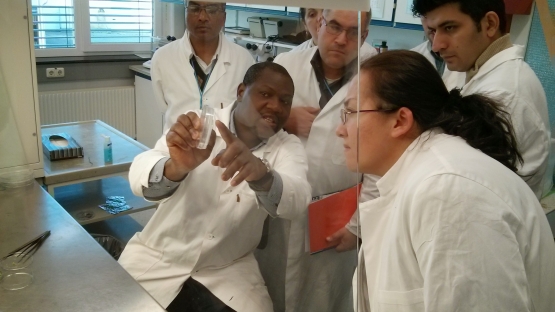Through its technical cooperation (TC) programme, the IAEA helps Member States to apply of nuclear techniques to improve agricultural management and increase crop production. One of the most efficient ways to improve crop yields is to eliminate crop losses to drought, crop diseases and pests. This is possible through the development of crop varieties resistant to these conditions. In nature, crops tend to adapt to their environment through spontaneous mutation, naturally enhancing resistance to the surrounding threats over time - this can take hundreds of years. By using nuclear techniques, it is possible to induce mutation and accelerate the natural mutation process, achieving the same results over a considerably shorter period of time.
Through the TC programme, the IAEA strives to spread knowledge of induced mutation techniques and to build capacities in their application, especially in regions like Africa, where crops are often stressed by climate change and viruses, hindering global efforts to alleviate hunger in the developing world.
To ensure that more countries are taking advantage of the opportunity to speed up the mutation process of crops, the IAEA carries out TC projects that help build capabilities in mutation induction and organizes various events and training courses that support capacity development in this area.
Recently, two new wheat varieties, resistant to a viral cereal fungus called UG99, were introduced in Kenya as a result of a TC project "Responding to the Transboundary Threat of Wheat Black Step Rust (UG99)". UG99 is a viral wheat black stem rust that has been spreading rapidly across Africa and South Asia, posing a major threat to global wheat and barley yields.
With the help of training courses, lectures and the development of laboratories to facilitate the research, the two new crop varieties were developed in only four years. This was an even faster development than expected - and using conventional methods would have normally taken a decade. Now that new varieties of stem rust resilient wheat have entered the Kenyan market, the IAEA continues to help other Member States with the accelerated development of their own varieties, adaptable to their environment.
As part of these efforts, the IAEA held another training course on mutation breeding to provide mutant variation for UG99 resistance on 25-29 November 2013. Organized under the same TC project, the course provided participants with basic knowledge and skills in the accelerated breeding of mutant traits with special reference to UG99. During the course, participants learned how to induce and detect desired mutant traits, and how identified mutant lines can be developed using accelerated breeding methods.
Through its TC programme, the IAEA makes every effort to share technologies, knowledge and experience in induced mutation breeding with its Member States to support the improvement of crop varieties in a fast and cost-effective manner. The aim of all TC activities is to provide Member States with practical experience and skills so that the techniques taught may be applied to practical breeding when the participants return to their home countries.
Accelerating the Natural Mutation Process of Valuable Crops to Increase Resistance to Harsh Conditions
03 Jan 2014
Related resources
More
Last update: 07 Nov 2017


